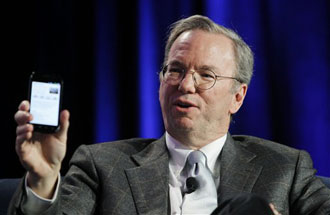Google Unveils Cell Phone with Payment System
Google Inc. is taking another stab at designing a game-changing mobile phone, this time by including a built-in payment system that could eventually enable the devices to replace credit cards.
The new phone got a brief preview Monday when Google CEO Eric Schmidt took the stage to kick off the Web 2.0 summit, a technology conference held annually in San Francisco.
Schmidt confirmed that Google has been working on a sophisticated new computer chip and an upgrade of its Android mobile operating system that will include a payment processing tool. He showed off the new phone with the device’s name and manufacturer concealed.
Several technology websites have speculated the new phone will be called “Nexus S” and will be manufactured by Samsung Electronics Co.
Google unveiled a phone called the Nexus One with much fanfare at the beginning of this year, but stopped selling it several months ago after other similar devices powered by Android hit the market. Samsung already makes several phones that run on Android software and just introduced a new computer tablet called Galaxy that’s powered by Google’s 3-year-old mobile operating system.
Schmidt declined to address the reports about the Nexus S. He indicated the new phone, equipped with the upgraded version of Android software called “Gingerbread,” will hit the market within the next few weeks.
The new phone will feature a Near Field Communication, or NFC, chip that will enable phones to transmit the payment information of the device’s owner to vendors using compatible technology. The transactions will be completed by tapping a physical point, such as a payment terminal or other objects encoded with the information needed to complete the purchase.
Schmidt said the chip will be more secure than the magnetic stripes that carry personal information on credit cards, an advantage that has been greeted enthusiastically by payment processors.
Google intends to forge partnerships with payment processors rather than try to expand into that line of commerce, Schmidt said. Although he expects mobile phones to supplant credit cards, Schmidt said the transition is still a long ways off.
“I still expect to be using credit cards for many, many years,” he told reporters after his presentation. As computer chips and mobile software continues to improve, Schmidt envisions the day when phones will be able to alert their owners when they are passing by a merchant with a product or service on their shopping list.
Mobile phones powered by Android have become ubiquitous since Google released the free mobile software two years ago. HTC Corp., which made the Nexus One, and Motorola Inc. are among the other major manufacturers that have developed Android handsets. The widespread usage helped Android surge to a 25.5 percent share of the market for mobile phone software, up from 3.5 percent a year ago, according to the research firm Gartner Inc. That ranked Android’s software second only to the Symbian operating system, a staple on Nokia Corp. phones, which holds a nearly 37 percent share, by Gartner’s reckoning.
MICHAEL LIEDTKE, AP Technology Writer SAN FRANCISCO

Google CEO Eric Schmidt holds up his Google phone as he speaks at the Web 2.0 Summit in San Francisco, Monday, Nov. 15, 2010. (AP Photo/Paul Sakuma)

